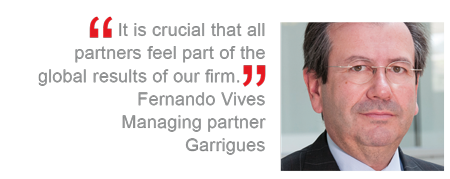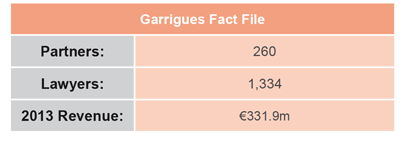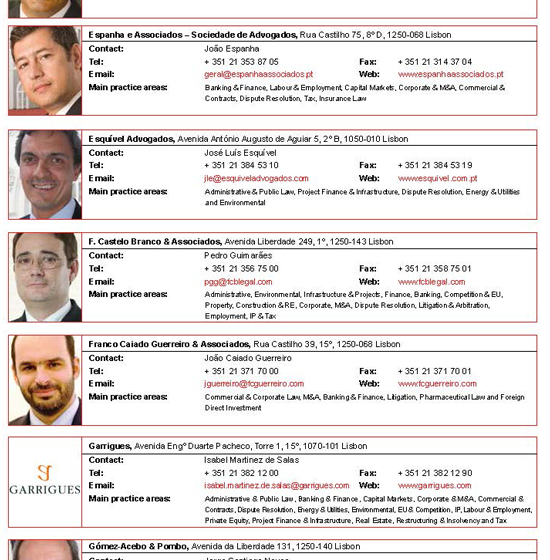Investing in people? – Garrigues
Revenue at Garrigues, the largest Iberian law firm, fell in the last year while lawyer numbers at the firm have dropped by more than a quarter over a five-year period. Yet it is one of the best places to work in Spain, according to a recent report. What´s the secret?
Garrigues is the best law firm to work for in Spain, according to a recent ranking published by Actualidad Económica. The ranking, which rates companies in Spain according to six criteria: talent management; remuneration and compensation; atmosphere; corporate social responsibility (CSR); training; and employee evaluation, placed the firm fifth overall, which meant it was the highest placed law firm in the table.
So, it seems, Garrigues is a firm with many happy lawyers. This is not an insignificant achievement as managing partners know that keeping lawyers content and motivated is difficult at a time of low growth. In fact, Garrigues did not grow at all last year, but rather contracted. The firm’s total revenue in 2013 stood at €331.9m, down 1.7 per cent on the previous year.
So how has Garrigues maintained such a positive work environment during such economically challenging times? Let’s start by looking at the firm´s remuneration and compensation system, which was one of the criteria on which the firm´s Actualidad Económica ranking was based on.
The firm´s managing partner Fernando Vives, who recently also assumed the role of executive chairman (replacing Antonio Garrigues), says the firm “rewards the achievements of its people through a performance-linked compensation system”. He explains that lawyers at the firm are paid by means of “fixed compensation” and “variable compensation”. The fixed compensation part is made up of a system of salary bands that are linked to seniority and role at the firm, while the variable compensation is determined on the basis of the firm´s overall earnings.
Vives says: “Our firm has sought to bring the variable compensation of its professionals more into line with profitable management objectives as well as with the encouragement of team work.” The firm reviews remuneration levels annually and also offers a range of other benefits, including life and accident insurance, as well as private medical insurance for the firm´s staff and their families.
 Pay-packets
Pay-packets
“The aim of our compensation and benefits system, together with the rest of the overall remuneration package, is to attract, motivate and retain talent,” says Vives. “In our view, our remuneration reflects the expectations for each level of experience and it fits the position and prestige of our firm in the legal sector.”
While, it is not clear how much lawyers at Garrigues actually earn, it has been reported that, in 2013, the firm´s income per lawyer stood at €234,000, up from €152,000 in 2008. While this looks impressive, it should be pointed out that the number of lawyers at Garrigues dropped by 27 per cent over the period. By way of comparison, income per lawyer at Clifford Chance stands at €353,000, for example. What lawyers earn depends largely on their practice area but it is said that, as a general rule, on average lawyers earn approximately a third of what they generate in revenue.
Vives says Garrigues´ remuneration and compensation system constitutes a “model that combines good professional performance and business growth on terms that allow us to create the necessary conditions to ensure our people can pursue a successful professional career”. Between 2008 and 2013, income per equity partner at Garrigues dropped from €3.2m to €1.3m, according to data from Expansión. This has been attributed, in part, to the fact that the firm brought all their salaried partners into equity over the period. This widening of the firm´s ownership has made the firm stronger, according to some analysts. Vives´ explanation for increasing the number of equity partners at the firm? “It is crucial that all partners feel part of the global results of our firm, and that they are in line with their objectives and strategy.”
Many managing partners acknowledge that incentivising associates in a market where there is very little growth can be difficult. Commenting on this issue, Vives says: “Our firm has made a great effort in recent years to improve our talent management, in keeping with more efficient economic management and improved profitability in order to bridge these gaps in a market with significantly lower growth.” He adds that, despite the general economic uncertainty, Garrigues´ intention is to maintain “our promotions policy and career paths”.
Towards the end of last year, Garrigues promoted 15 lawyers to partner. However, whether Garrigues meets all its lawyers´ career aspirations is open to question; last year saw the departures of Alberto Escudero to Baker & McKenzie and Eduardo Sánchez-Ramade to Cuatrecasas, Gonçalves Pereira. Garrigues currently has a total of 1,334 lawyers. Spanish newspaper Expansión reported that Garrigues had 1,417 lawyers in 2013. It suggests lawyer numbers have declined by 83 in the last year, but a Garrigues spokeswoman says the figure published by Expansión included non-lawyers at the firm.
Another of the criteria that was in the Actualidad Económica research was the provision of training. So what coaching does Garrigues provide for its lawyers? Vives explains that new graduates joining the firm in Spain study an executive master´s degree in Business Law in their first year, with the teaching provided by Centro de Estudios Garrigues. “This provides [new graduates] with comprehensive training for the provision of professional legal advisory services to companies, both domestic and foreign, giving them a broad overview of company law,” Vives says. “Our professionals also regularly attend seminars, refresher courses and workshops given within the different specialist groups, as well as industry-specific training initiatives that enable them to know the market and business of each sector or industry.”
Legal knowledge is not enough
Vives acknowledges that a new type of lawyer is now required, who is a “more competitive and fully-rounded professional than a traditional lawyer”. He adds that legal knowledge alone is no longer sufficient. “This environment demands ethical conduct, good command of languages, speed and flexibility to adapt to changes and understand client´s day-to-day needs,” Vives says.
Consequently, Garrigues places a great deal of importance on training its lawyers in “ethical and good professional practices”, management skills – including leadership, teamwork, negotiation, and communication – languages, as well as information technology and “knowledge management”. The firm also organises what it describes as “Garrigues Schools”, which are short courses that take place away from the working environment and last a few days.
With regard to the evaluation of its lawyers, Garrigues conducts annual individual reviews, which include written assessments and face-to-face interviews with the respective line managers. Vives says the face-to-face interviews are a fundamental part of the process. “Interviews are thoroughly prepared to ensure that communication is clear, two-way, constructive and efficient as possible.”
Vives says lawyer evaluations should not only cover legal knowledge but also: client management skills, including client-focus and client satisfaction levels; personal skills such as communication, negotiation, and leadership skills; management skills, including organisation, planning and delegation; and the management of internal human resources, specifically people development, formation of teams and motivation. He adds: “We also require a commitment to Garrigues´ values and culture, to the brand and what it represents in the legal and business community and business community and in society in general, as well as absolute commitment to the Garrigues code of ethics.”
Team spirit
What of Garrigues´ “atmosphere”? Vives says: “The relationships among colleagues, teamwork and the spirit fostered in each work group at Garrigues are among our greatest assets.” He adds that a spirit of collaboration, ethics, “capacity for dialogue”, vocation for service, work and respect for the strictest ethical and professional team standards are among the firm´s core values. “Being close to all our professionals, encouraging decision-making and active participation by all members of the team enables us to meet the personal and professional objectives of each individual,” Vives says.
With regard to CSR, the firm adopts a model that analyses the economic, social and environmental effects of its activities on our stakeholders, according to Vives. “We were the first major Spanish law firm – and continue to be the only law firm – to publish an annual corporate social responsibility report,” he claims. Vives adds that the provision of pro bono services is a cornerstone of the firm´s CSR programme. The firm provides pro bono tax and legal advisory services to not-for-profit organisations involved in charitable, welfare, cultural or educational activities. Vives says in the last year the firm provided such services to more than 25 organisations.
However, despite Vives´ claim that Garrigues has always been “fully committed to social responsibility”, a recently conducted firm-wide poll showed that less than 65 per cent of respondents indicated their willingness to participate in pro bono work. But Vives insists that integrity and ethics is important to lawyers at Garrigues. Referring to the firm-wide poll, he says: “When asked about the image the firm projects, the most valued trait was ´integrity and ethics within the firm´. It is clear, therefore, for us, that Garrigues needs to continue moving forward in this direction because, besides being important to our clients and other stakeholders, our own people consider it a key aspect of their daily activity.”













